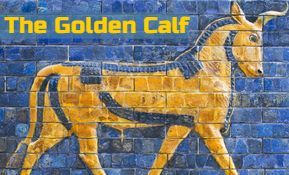
Behaalotcha: A Babe in His Arms
This was the praise of “the lovingkindness of your youth, the love of your nuptials.” The realities of the natural world meant...

“According to the word of Hashem, the children of Israel traveled, and according to the word of Hashem, they encamped” (Bamidbar 9:18).
Rashi explains: “When the people of Israel traveled, the cloud would fold and spread itself over the tribe of Yehudah in a beam-like formation. They blew a tekiah (long blast), a teruah (series of short blasts), and another tekiah on the trumpets, but it did not move on until Moshe (Moses) declared, ‘Rise up, Hashem” (10:35), and then the banner of Yehudah’s camp would travel.
“When it was time for the people of Israel to encamp, the pillar of cloud would mushroom upward and spread itself over the tribe of Yehudah like a canopy. It would not depart until Moshe declared, ‘Return Hashem, to the myriads of Israel’s thousands’ (10:36). This is what is meant by: ‘According to Hashem’s word, through Moshe’ (Ibid 23).”
Like a Babe in His Mother’s Arms
Rabbi Chaim Shmuelevitz clarifies this section of the Parsha with a beautiful concept concerning our relationship with God. To appreciate his words, we will first learn a piece of the Talmud concerning the laws of Shabbat:
“Ula explained that Rabbi Yossi takes the view that one who takes down a wall on Shabbat in order to build another wall in the same spot is doing the work of ‘dismantling’ and is liable. However, if he tears down the wall in order to take the materials and build the wall somewhere else, then his act is not considered ‘dismantling,’ because the very act of tearing it down is destructive.”
Ula reasoned that if a person tears down a wall in order to use the materials, it is not halachically defined as dismantling (soter). It is only considered dismantling if he wants to build a new wall in the same place.
“Rabbah said to Ula: Behold, all the forms of work on Shabbat are derived from the Tabernacle. And there, it was a case of dismantling in order to rebuild in a different place!” The Jews in the desert took the Tabernacle apart before they continued their journey, so they could reassemble it in the new encampment.
“Ula replied to Rabbah: It was different there! Since it is written: ‘According to the word of Hashem they would encamp’ (Bamidbar 9:23) it was similar to a case of dismantling in order to rebuild in the same place” (Shabbat 31b).
Ula’s reply seems baffling. The Children of Israel actually dismantled the Tabernacle to rebuild it somewhere else. Yet, according to Ula’s reasoning, that would not be considered “dismantling” on Shabbat! What difference does it make that they traveled “according to the word of Hashem?”
Rabbi Shmuelevitz brings a beautiful metaphor to explain Ula’s response. Imagine a mother carrying her tender infant in her arms as she travels from city to city. If we could ask the infant where he is at any point in time, he would no doubt answer: “In my mother’s arms.” No matter where they were, be it a dangerous forest or a city street, he would give the same response. The world outside his mother’s arms has no meaning for him. He is being carried in his mother’s arms.
The Children of Israel were lauded by the praise: “I remember to you the lovingkindness of your youth, the love of your nuptials, your following Me in the desert, in a land not sown” (Yirmiyahu 2:2). This does not mean the Children of Israel marched into the desert with suicidal intentions. Six hundred thousand men, accompanied by their wives and children, numbering in the millions, set out for the desert. “That great and awesome desert, in which were snakes, vipers and scorpions, and drought, where there was no water” (Devarim 8:15). Yet, they went as if they were going to a settled land full of fountains, fruit orchards, and gardens.
This was the praise of “the lovingkindness of your youth, the love of your nuptials.” The realities of the natural world meant nothing to the Children of Israel. There was only one reality – their closeness to the Creator.
In every moment of their travels they felt enveloped by that closeness to Hashem. This feeling of trust in God was so overwhelming that they felt as if they were continuously in Hashem’s hands, like an infant in his mother’s arms. Therefore, even if their tent dwellings shifted over the desert sands they always considered themselves to be in the same place—next to Hashem!
This is what Ula is saying: “Since it is written: ‘According to the word of Hashem they would encamp’ (Bamidbar 9:23) it was similar to a case of dismantling in order to build in the same place.” Since their entire life was focused on closeness to Hashem and they lived entirely “according to the word of Hashem,” they were always in the same place, no matter where they traveled. (Sichot Mussar, 5733, pg. 72-3).
How Do We Acquire Faith?
Mankind is always looking for something new. Our natural curiosity pushes us to increase our knowledge and understanding and gives us the ability to acquire wisdom. At the same time, however, the Yalkut Maamarim writes that we have to rein in our intellect when dealing with certain issues.
Youth are generally full of vitality and alert to their surroundings. When they see something they do not understand they tend to criticize and reject it. Older people tend to be more apathetic, and when they do not understand something, they shrug their shoulders and ignore it. These two approaches are also common it comes to matters of emunah, faith.
But both these approaches are the opposite of emunah. They are based on the idea that if we cannot understand something, we must either reject it or ignore it.
Emunah is acquired through negating our arrogance and humbling ourselves before the Almighty. Through humility we are able to accept the events we see even if we do not understand them.
This was the character trait exhibited by Avraham (Abraham) when he went to bind his son Yitzchak (Isaac) on the altar, although human sacrifice ran counter to everything he believed in. This humble self-abnegation was what enabled the Jewish people to proclaim: “We shall do and we shall hear” before accepting the Torah at Mount Sinai.
The yetzer hara (evil inclination) tries to eradicate our humility. As Rashi explains in the beginning of Parshat Chukat: “This is the statute of the Torah which Hashem commanded, saying, Speak to the children of Israel and have them take for you a perfectly red unblemished heifer, upon which no yoke was laid”—“Because Satan (the yetzer hara) and the nations of the world taunt Israel, saying, ‘What is this commandment, and what purpose does it have?’ Therefore, the Torah uses the term ‘statute.’ I have decreed it; You have no right to challenge it” (Bamidbar 19:1).
The Satan pushes us to be overly critical and seeks to prevent us from humbling ourselves before Hashem. This is an outlook that was championed by the nations of the world, as the following Midrashic selections show.
A Wholehearted People
“This is the blessing that Moshe, man of God, bestowed on the Israelites just before his death. He said: God came from Sinai, shone forth to them from Seir, and made an appearance from Mount Paran” (Devarim 33:2).
Seir was Esav’s (Esau’s) territory and Mount Paran was Yishmael’s (Ishmael) territory. According to the Midrash, this teaches that God offered the Torah to Esav and Yishmael before giving it to Israel (Avodah Zarah 2b). When offered the Torah, each of these nations asked the same question: “What is written in it?” They both refused to accept the Torah because it prohibited their predilections to kill and steal.
For the people of Israel, however, there was no hesitation. Before even hearing the contents of the demanding contract, the people declared with passion and devotion, “We will do, and we will obey” (Shemot 24:7).
The Talmud tells the story about a Sadducee who saw Rava so engrossed in learning that he did not take care of his wounded hand! The Sadducee exclaimed, “You rash people! You put your mouths ahead of your ears [by saying ‘we will do and we will hear’] and you still persist in your recklessness. First, you should have heard out the covenant’s details. If it is within your powers, then accept it. If not, then you should have rejected it!”
Rava answered, “We walked with our whole being.” Rashi writes in his classic Talmudic commentary: “We walked…as those who serve God in love. We relied on God not to burden us with something we could not carry. Of us it is written, ‘The wholeness (meaning wholeheartedness) of the righteous shall guide them’” (Shabbat, 88a-b).
The Jew accepts Hashem’s will with total innocence and simplicity, and this in turn leads him accept everything with self-abnegation and complete agreement. This is the true way of emunah. To establish this trait in the Jewish people, God led them in the desert for forty years. Their forty year journey was a “university” of emunah.
“And according to the cloud’s departure from over the Tent, and afterwards, the children of Israel would travel, and in the place where the cloud settled, there the children of Israel would encamp. According to the word of Hashem, the children of Israel traveled, and according to the word of Hashem, they encamped” (Bamidbar 9:17-18).
The Ramban explains that even if the cloud remained in a site that the people found inhospitable, they submitted to God’s will. There were times that the people may have wanted a long rest from a difficult journey, but the cloud moved on (v. 20), and there were other times that they would have only an overnight rest from travel, and be forced to leave in the morning (v. 21). Whatever the situation, the people marched and rested without complaint, according to the word of God, as indicated by the cloud.
The people of Israel accepted their travels in the desert without questions. They fulfilled the will of God, and the challenges presented by their desert journey instilled the quality of deep emunah in the Jewish nation. The Jewish people grew in Torah and wisdom, their constant occupation during those forty years, and their emunah blossomed into complete trust in the One Above, so they became like a babe in his mother’s arms.










Tell us what you think!
Thank you for your comment!
It will be published after approval by the Editor.